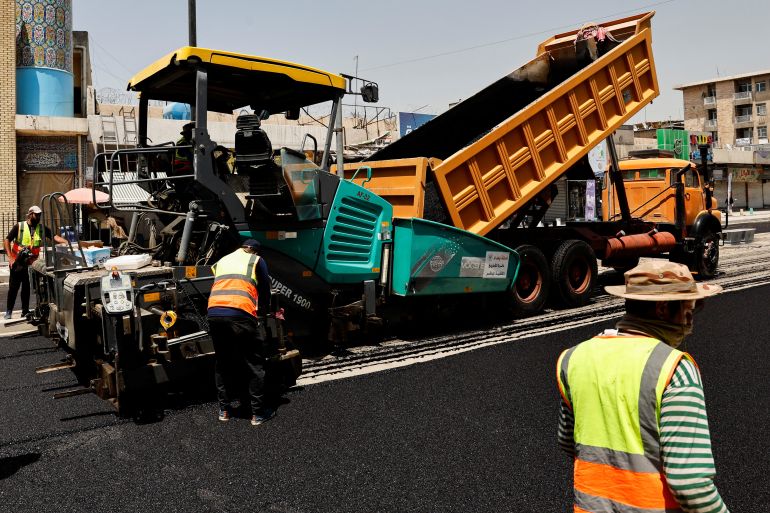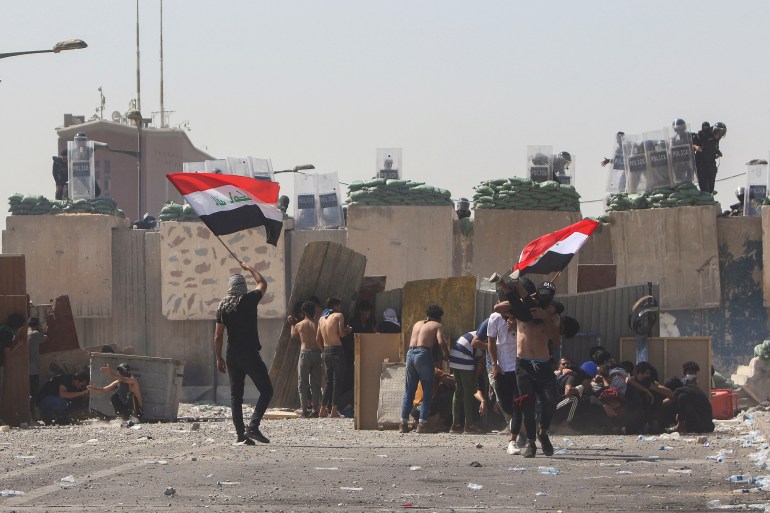Iraq approves record $153bn budget aimed at creating jobs
Iraq passes its largest budget till date aimed at creating public sector jobs and build war-damaged infrastructure.

Iraq’s parliament has approved a budget of 198.9 trillion dinars ($153bn) for 2023 that sets out record spending on a growing public wage bill and development projects to improve services and rebuild infrastructure ruined by neglect and war.
Al Jazeera’s Mahmoud Abdelwahed, reporting from Baghdad, said on Monday that the approved budget is the largest in the country’s history, covering three years – 2023, 2024 and 2025.
Keep reading
list of 4 itemsWill oil prices keep rising, and how will that affect inflation?
Iraq’s overreliance on oil threatens economic, political strife
South Sudan on the brink after oil exports derailed by Sudan’s civil war
“This amount is allocated for several aims, including reforms, infrastructure, development plans and creation of jobs,” Abdelwahed said.
Deputy Speaker of the Iraqi Council of Representatives Shakhwan Abdullah Ahmed said in a statement: “Basic services must be secured, infrastructure rehabilitated, employment and work opportunities provided, affected areas reconstructed, and the suffering of displaced people ended.”
The budget aims to create tens of thousands of public sector jobs as the country, which has been racked by decades of war and sectarian strife in the wake of the 2003 US military invasion, wants to improve services and rebuild war-damaged facilities.
The country has one of the fastest-growing populations in the world, projected to double from 43 million to about 80 million by 2050, while most of the economy is state-led, with high unemployment. The country has seen frequent protests over the lack of jobs and public services.
“Many people here, especially in Baghdad, are optimistic about the endorsement of this budget. They are hopeful that the infrastructure that have been destroyed by years of neglect and wars will be finally maintained by this budget and more jobs are hoped to be created,” Al Jazeera’s Abdelwahed said.

Burgeoning fiscal deficit
But many observers have raised concerns against Iraq’s burgeoning fiscal deficit, which is estimated at a record 64.36 trillion Iraqi dinars ($49bn), more than double compared with the 2021 budget, according to a budget document and lawmakers.
Ahmed Tabaqchali, a visiting fellow at the London School of Economics Middle East Centre, put the figure of new employees at about 600,000, which he said would raise the total cost of public wages and pensions to more than 76 trillion dinars ($58bn).
“The more you increase this kind of spending, the more you increase your vulnerability. The oil price has to go higher and higher just to sustain spending which is crippling and will lead to more and more borrowing,” he said.
The budget was delayed due to instability and political wrangling.
“It has taken too long because of political wrangling among lawmakers as each bloc in the parliament wants to put the interest of their regions first,” Abdelwahed said.
The budget is based on an oil price of $70 per barrel and projects oil exports at 3.5 million barrels per day (bpd), including 400,000bpd from the semi-autonomous Kurdish region, lawmakers said.
Analysts have raised concerns about the expected oil revenue as the crude prices as well as production levels fluctuate with global demands given Iraq’s near-total dependence on oil revenue.
The International Monetary Fund in a May 31 note said the increasing public wage bill would contribute to mounting deficits and financial pressure, barring a big increase in oil prices.
To break even, Iraq required an oil price of $96, it said, while the price averaged $71.3 in May.
“A significantly tighter fiscal policy is needed to strengthen resilience and reduce the government’s dependence on oil revenues while safeguarding critical social spending needs,” the IMF said.
Longstanding issues between Iraq and Kurdish region
First Deputy Speaker of Parliament Mohsen al-Mandalawi, issuing a statement, stressed on “reducing spending and increasing non-oil revenues to maximise state revenues” in agriculture, service and reconstruction sectors.
The budget also takes steps to address longstanding issues between Iraq and the Kurdish region, with its oil revenues set to be deposited in an account overseen by the Iraqi central bank.
Iraq previously had no say over the Kurdish region’s expenditure of oil revenues, which unilaterally exported crude via Turkey despite Baghdad’s objections.
But Kurdish officials were forced to negotiate with Baghdad after Turkey halted crude exports in April when an international arbitration ruling deemed them unlawful.
Under an agreement signed between Baghdad and Erbil in April, Iraq’s state-run marketing company SOMO will have the authority to market and export crude oil produced from fields controlled by the Kurdish region.